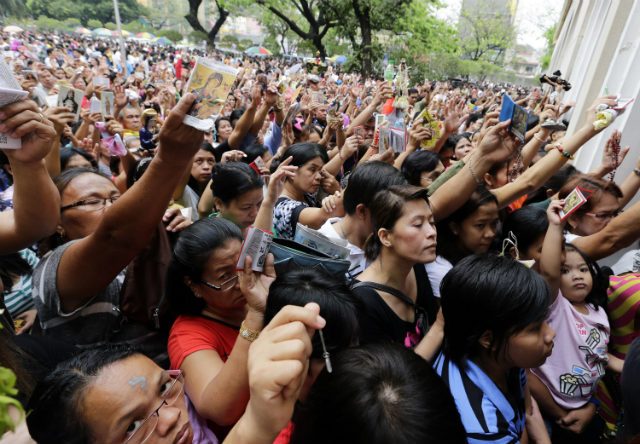SUMMARY
This is AI generated summarization, which may have errors. For context, always refer to the full article.

MANILA, Philippines – Unlike Facebook and Twitter users in most other developing countries, Filipinos on social media find religion more interesting than politics, the US-based Pew Research Center said.
Religion, in fact, is the Philippines’ third most popular social media topic.
In its report on Thursday, March 19, Pew Research Center said 26% of Filipinos use social media to share their views about religion.
On social media, those who share their views about politics comprise only 16% of Filipinos.
Below is the breakdown of the most popular social media topics in the Philippines:
- Music and movies – 71%
- Sports – 50%
- Religion – 26%
- Products they use – 21%
- Politics – 16%
The Philippines stands out because among most emerging and developing countries, religion is the least popular social media topic.
Below is the breakdown for the rest of the world:
- Music and movies – 72%
- Sports – 56%
- Products you use – 37%
- Politics – 34%
- Religion – 30%
This study by Pew Research Center, a decade-old think tank based in Washington DC, covers emerging and developing nations such as the Philippines. It gives us a glimpse of the effects of the Internet on various aspects, ranging from education to politics. (READ: Movies, music most shared on social by developing countries)
The portions about religion and morality add color to at least two facts about the Philippines:
-
The Philippines is Asia’s most predominantly Christian country, with at least 80.58% of Filipinos belonging to the Catholic Church
-
Earlier studies call the Philippines the “social media capital” of the world
The Pope’s trip to the Philippines in January confirms the think tank’s findings.
In a news release, telecommunications giant Smart Communications said the papal visit “broke Twitter records” in the Southeast Asian country. Filipinos produced more than 3.3 million tweets “related to the papal visit” from January 13 to 20, Smart reported.
Filipinos, in fact, gave the Vatican the most retweeted tweet from the Pope’s Twitter account, @Pontifex.
This was the Pope’s first tweet in the local language: “Ang Pilipinas ay patunay ng kabataan at kasiglahan ng Simbahan.” (The Philippines bears witness to the youthfulness and vitality of the Church.)
This tweet had “nearly 76,000 retweets,” Smart said.
The papal visit also generated hashtags such as Rappler’s #ShowThePope, a crowdsourcing effort for photos of anything Filipinos want the Pope to see in the Philippines. (READ: Social media gift for Pope Francis: #ShowThePope photos)

Defying global statistics
The Pew Research Center report covers another aspect related to religion: morality.
Again, the Philippines defied global statistics.
Unlike most other emerging and developing countries, more Filipinos think the increasing use of the Internet has had a positive influence on morality.
Pew Research Center said 47% of Filipinos see the Internet as positive for morality.
On the other hand, 39% of Filipinos see it as negative, while 10% think it doesn’t influence morality.
Worldwide, when it comes to morality, only 29% view the Internet as positive.
Those who think it’s a bad influence comprise 42% of global respondents. The remaining 12% say it exerts no influence.
Pew Research Center arrived at its data on the Philippines after interviewing 1,008 Filipino adults from May 1 to 21, 2014. Its margin of error is ±4 percentage points.
The think tank used different methodologies in other countries. – Rappler.com
Add a comment
How does this make you feel?
There are no comments yet. Add your comment to start the conversation.